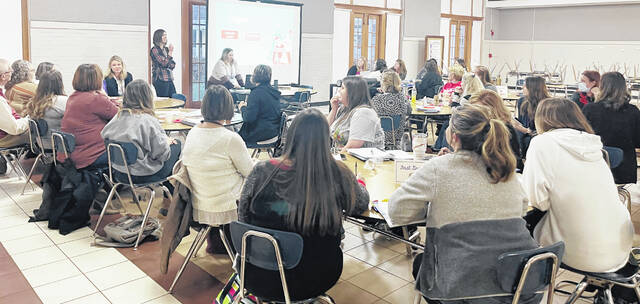
A few months ago the Greenfield Exempted Village School District embarked on a new journey of reading, the science behind teaching and learning this most fundamental skill.
In September, Alisa Barrett, the district’s director of instruction, explained the new program at a school board meeting. She talked about the literacy struggles with kindergarten through third grade students, a struggle not only for the district, but across the nation.
One of the ways Greenfield is addressing this is by an in-depth science of reading study by 44 elementary educators in the district. The study is called LETRS (Language Essentials for Teachers of Reading and Spelling), and it’s an intense professional development program that “teaches our teachers the brain science behind reading,” which is not what they learned in college. It’s something that provides educators with the strategies and knowledge they need to help their students succeed in reading.
“Learning to read is literally rocket science,” Barrett said. “As the brain learns to read and spell, pathways and connections are created within the brain. Previously, reading instruction was taught through sight and memorization. Strategies included flashcard practice, reading lists of sight words, and leveled readers. Now, our students are learning how to break words apart to decode and spell based on phonics rather than on memorization.”
Every few years, the district goes through a new textbook adoption cycle. This time around, it’s “Wonders 2020” by McGraw-Hill. The choice came after many hours of research and discussion by the committee, Barrett said, which felt this book most closely aligned with the science of reading, the body of research behind the whole shift in learning, and teaching reading.
“The science of reading places an instructional focus on students breaking the code of our language,” Barrett said, “meaning students learn how to phonetically read and spell.”
The nearly two dozen personnel involved in the intense professional development include Barrett, the school psychologist, the building principals, the speech pathologists, the general education teachers, intervention specialists, Title 1 teachers, and Title 1 aides.
“Professional development for staff is an integral part of reading instruction,” Barrett said. “The greatest factor of student achievement is the teacher. It does not matter what instructional program or textbook is adopted, if the teacher does not have the knowledge of evidence-based practices and standards, all students will not learn what they need to learn. This is why we are investing so much time and effort into LETRS. Our students deserve to learn from teachers and staff members with the highest level of knowledge in reading instruction.”
This isn’t the first time LETRS has come up in the district. Last school year the program was piloted by preschool teachers. In May of 2021, the district began the two-year professional development program which includes grades K-5.
So far, the study has helped staff members gain an enormous amount of knowledge to better help students learn how to read and spell, Barrett said.
“Staff members are sharing countless stories of how their students are learning to read and spell at a faster rate,” Barrett said. “Through new assessments, staff members are also able to better determine reading difficulties so they can provide more targeted instruction.”
She said that the majority of staff members were not trained in the science of reading in college, adding that there are only a few colleges currently teaching based on this body of research.
While a lot of colleges and universities may not be teaching the science of reading, it is being slowly embraced. “With new mandates, we hope they will eventually be required to provide this training so teachers are better prepared when entering the reading classroom,” Barrett said.
On Jan. 13, from 6 – 7 p.m., parents and guardians will have the opportunity to learn more about the science of reading when a session will be held in the cafetorium on the main campus in Greenfield. During the session, information will be shared about the shift to instructional practices based on the science of reading, as well as the new reading textbook “Wonders 2020.” All parents and guardians of elementary students are encouraged to attend the session.
“It is exciting to see our teachers becoming experts on the science of reading. Our team is learning, practicing, collaborating and leading the way to implementing effective research-based instructional practices for all students,” superintendent Quincey Gray said. “I appreciate the guidance and support that Mrs. Barrett has provided teachers during this journey.”
Angela Shepherd is a correspondent for the Greenfield Exempted Village School District.


